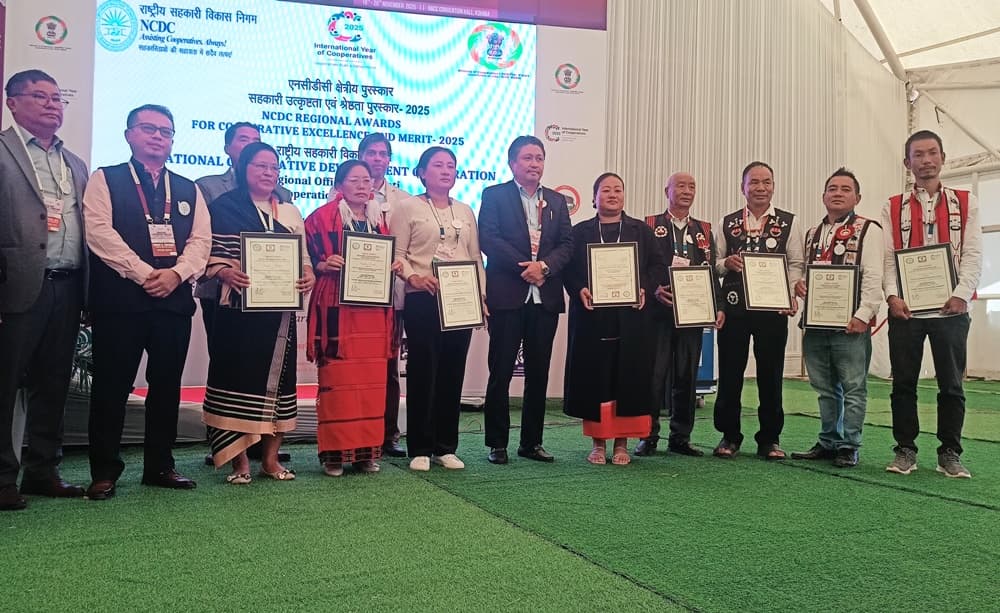The Nagaland Cooperative Conclave was held at the NBCC Convention Hall, Kohima. The conclave will culminate on November 20.
Share

KOHIMA — Minister of PHED and Cooperation, Jacob Zhimomi, on Tuesday said development cannot be imported, but that people have to develop their own state, villages, towns, and economy collectively.
The minister stated this while addressing the Nagaland Cooperative Conclave held at the NBCC Convention Hall, Kohima. The conclave will culminate on November 20.
Calling the conclave an important initiative for a welfare state like Nagaland, Zhimomi said the government’s primary concern is to ensure the welfare of every citizen in every village in the country.
The event, he added, was an opportunity to celebrate the journey and contributions of cooperative societies in the state.
Zhimomi noted that although the cooperative movement in India has long worked silently behind the scenes, its role in nation-building has been significant.
He highlighted that the Ministry of Cooperation, established under Prime Minister Narendra Modi in 2021, is promote and bring about tangible development and grassroots growth involving community participation in the country.
Zhimomi asserted that when India got its Independence, the country was dependent on foreign goods and services, and as a result, local traders, small-scale industries, cottage industries, and medium industries suffered because of the import of cheap products from foreign lands for a very long time.
However, he maintained that as the country celebrates its 75th year of Independence, it has realised that it is time for India to promote local industries, enterprises, entrepreneurs, trade and commerce, and local producers so that the nation is not dependent on other sovereign countries.
In this regard, he stated that Prime Minister Modi has started a movement called Atmanirbhar Bharat, which means “vocal for local.”
“We have to start promoting our own goods and services; we have to promote our own entrepreneurs; we have to trust and develop faith in our own products,” he said.
Reflecting on India’s economic progress, he said the country has risen from the ninth-largest economy before 2014 to the fourth-largest today, and aspires to reach third place in the next few years.
He added that the Nagaland government, aligning with the national vision, has adopted Viksit Nagaland and Viksit Village as guiding frameworks and asserted that cooperatives would play a crucial role in this journey.
The minister encouraged cooperative societies to diversify beyond traditional green and light industries and explore emerging sectors such as tourism, which he described as one of Nagaland’s most promising industries.
He also stressed youth involvement, drawing attention to the “Yuva Sahakar – Cooperative Enterprise Support and Innovation Scheme,” a youth-centric initiative implemented by the National Cooperative Development Corporation (NCDC) aimed at fostering youth engagement in cooperative enterprises.
The minister called upon the Cooperative department to guide cooperative societies so they can perform well and contribute to the state’s endeavours. He also called on the department to conduct seminars in all districts to micromanage and guide the activities of cooperative societies in Nagaland.
Calling for transparency and accountability, the minister said digitisation of cooperatives is essential to ensure good governance, fair business practices, and sustainable growth.
He informed that Nagaland currently has 8,413 registered cooperative societies, although many have remained inactive over the past three years. He encouraged renewed effort, saying that with access to education, information, and technology, societies must become more proactive and self-reliant.
A speech was also delivered by Agriculture Production Commissioner (APC) Nagaland, V Shashank Shekhar, and Commissioner and Secretary Cooperation and IPR, Orenthung Lotha, delivered the keynote address.
On the occasion, Micro ATMs were distributed to PACS, an MoU was signed between NCEL and MARCOFED Ltd., and various awards were presented.
• Best Primary Credit Coops (PACS): First prize - Self Support Women MPCS Ltd., Science College, Kohima; Second prize - Atsitsa Large Area MPCS Ltd., Kiphire
• Best Primary Cooperatives: First prize - Adianu Agri & Allied Cooperative Society Ltd., Longsa village, Mokokchung; Second prize - Moutshou Agri & Allied Cooperative Society Ltd., Chendang village, Tuensang
• Best Women Cooperatives: First prize - Mima Noh Weaving & Industrial Cooperative Society Ltd., Tuensang; Second prize - Thenumin Kehou MPCS Ltd., Vidima village, Chümoukedima
• Best FPO Cooperatives: First prize - Kade FPO Cooperative Society Ltd., Pfutsero, Phek; Second prize - Tchutho Cooperative FPO Ltd., Meriyan village, Wokha.